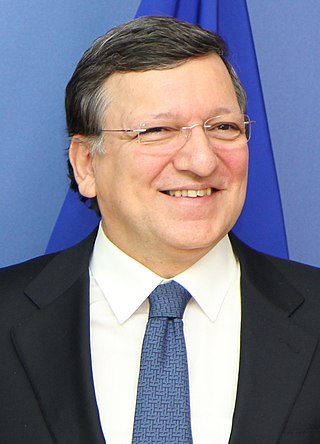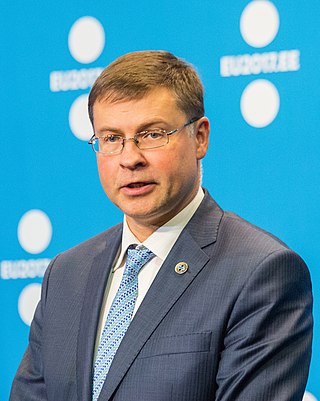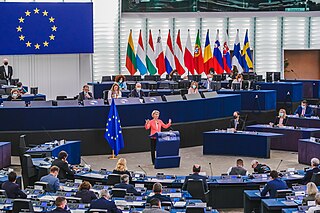| |||||
| Decades: | |||||
|---|---|---|---|---|---|
| See also: | |||||
Events in the year 2010 in the European Union.
2010 was designated as the:
- European Year for Combating Poverty & Social Exclusions
| |||||
| Decades: | |||||
|---|---|---|---|---|---|
| See also: | |||||
Events in the year 2010 in the European Union.
2010 was designated as the:
The European Capital of Culture is a city designated by the European Union for a period of one calendar year, during which it organises a series of cultural events with a strong European dimension.

The European Union is a geo-political entity covering a large portion of the European continent. It is founded upon numerous treaties and has undergone expansions and secessions that have taken it from six member states to 27, a majority of the states in Europe.

The euro area, commonly called eurozone (EZ), is a currency union of 20 member states of the European Union (EU) that have adopted the euro (€) as their primary currency and sole legal tender, and have thus fully implemented EMU policies.

José Manuel Durão Barroso is a Portuguese politician and university teacher, currently serving as non-executive chairman of Goldman Sachs International. He previously served as the 11th president of the European Commission and the 115th prime minister of Portugal.

The president of the European Council is the person presiding over and driving forward the work of the European Council on the world stage. This institution comprises the college of heads of state or government of EU member states as well as the president of the European Commission, and provides political direction to the European Union (EU).
European integration is the process of industrial, economic, political, legal, social, and cultural integration of states wholly or partially in Europe or nearby. European integration has primarily come about through the European Union and its policies.

The Executive Vice President of the European Commission for An Economy that Works for People is the member of the European Commission responsible for economic and financial affairs. The position was previously titled Commissioner for Economic and Monetary Affairs and the Euro and European Vice President for the Euro and Social Dialogue from 2014 to 2019. The current Executive Vice President is Valdis Dombrovskis (EPP).
Eurobonds or stability bonds were proposed government bonds to be issued in euros jointly by the European Union's 19 eurozone states. The idea was first raised by the Barroso European Commission in 2011 during the 2009–2012 European sovereign debt crisis. Eurobonds would be debt investments whereby an investor loans a certain amount of money, for a certain amount of time, with a certain interest rate, to the eurozone bloc altogether, which then forwards the money to individual governments. The proposal was floated again in 2020 as a potential response to the impacts of the COVID-19 pandemic in Europe, leading such debt issue to be dubbed "corona bonds".
Events in the year 2008 in the European Union.
Events from the year 2009 in the European Union.

In the European Union (EU), enhanced cooperation is a procedure where a minimum of nine EU member states are allowed to establish advanced integration or cooperation in an area within EU structures but without the other members being involved. As of October 2017, this procedure is being used in the fields of the Schengen acquis, divorce law, patents, property regimes of international couples, and European Public Prosecutor and is approved for the field of a financial transaction tax.

The Union for the Mediterranean is an intergovernmental organization of 43 member states from Europe and the Mediterranean Basin: the 27 EU member states and 16 Mediterranean partner countries from North Africa, Western Asia and Southern Europe. It was founded on 13 July 2008 at the Paris Summit for the Mediterranean, with an aim of reinforcing the Euro-Mediterranean Partnership (Euromed) that was set up in 1995 as the Barcelona Process. Its general secretariat is located in Barcelona, Catalonia, Spain.

The Eurogroup is the recognised collective term for the informal meetings of the finance ministers of the eurozone—those member states of the European Union (EU) which have adopted the euro as their official currency. The group has 20 members. It exercises political control over the currency and related aspects of the EU's monetary union such as the Stability and Growth Pact. The current President of the Eurogroup is Paschal Donohoe, the Minister for Public Expenditure, National Development Plan Delivery and Reform of Ireland.

The history of the European Union from 2004 to the present is the current timeline of the European union. It is a period of significant upheaval and reform following the 2004 enlargement of the European Union. The EU has taken on ten new members, eight of which were initially much poorer than the EU average, and took in a further two in 2007 with many more on the way. It created the euro a few years before and had to expand this, and the Schengen Area to its new members. However this was overshadowed by the late-2000s recession and damaging disputes over the European Constitution and its successor, the Treaty of Lisbon. Throughout this period, the European People's Party has been the largest group in the European Parliament and provides every President of the European Commission.

From late 2009, fears of a sovereign debt crisis in some European states developed, with the situation becoming particularly tense in early 2010. Greece was most acutely affected, but fellow Eurozone members Cyprus, Ireland, Italy, Portugal, and Spain were also significantly affected. In the EU, especially in countries where sovereign debt has increased sharply due to bank bailouts, a crisis of confidence has emerged with the widening of bond yield spreads and risk insurance on credit default swaps between these countries and other EU members, most importantly Germany.

The State of the Union address, also known as the State of the European Union or SOTEU, is the annual speech addressed by the President of the European Commission to the European Parliament plenary session in September. The State of the Union address of the European Union was instituted by the Lisbon Treaty, in order to make political life of the Union more democratic and transparent than it previously had been.
Events from the year 2011 in the European Union.

Relations between the European Union and the Palestine Liberation Organisation (PLO) were established in 1975 as part of the Euro-Arab Dialogue. The EU is a member of the Quartet and is the single largest donor of foreign aid to the Palestinian Authority.

The Euro summit is the meeting of the heads of state or government of the member states of the eurozone. It is distinct from the EU summit held regularly by the European Council, the meeting of all EU leaders.
Events in the year 2015 in the European Union.
Events in the year 2014 in the European Union.